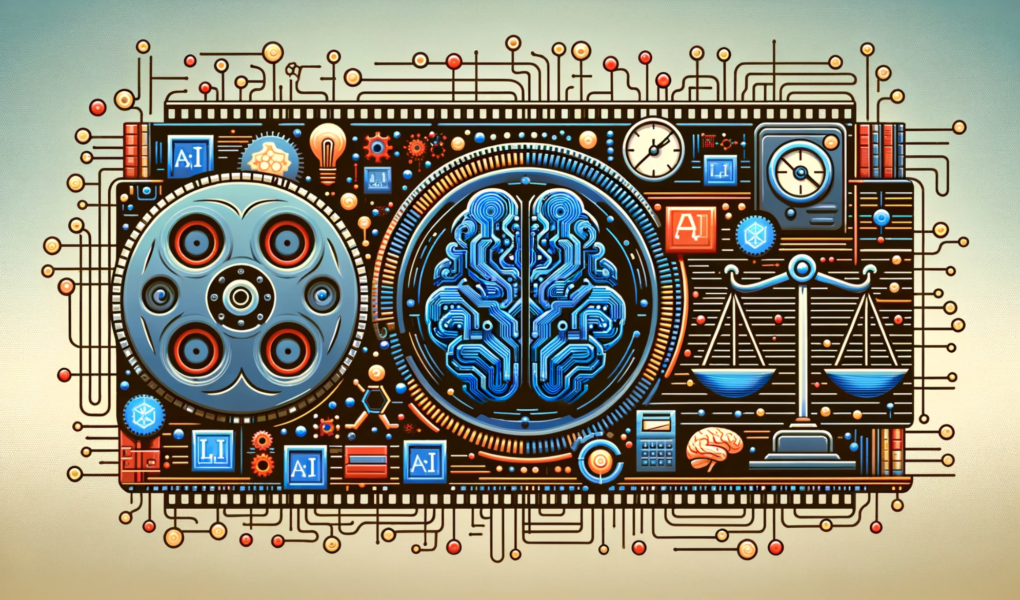Documentary filmmaking has always been a powerful medium for exploring and understanding the world around us.
From exposing social injustices to shedding light on remarkable human achievements, documentaries have the ability to inform, inspire, and provoke thought.
In recent years, the integration of artificial intelligence (AI) in documentary filmmaking has sparked discussions about the ethical implications of this technology in the industry.
In this deep dive, we’ll explore the intersection of AI and documentary filmmaking, unpacking the ethical considerations that arise from this technological advancement.
The Rise of AI in Documentary Filmmaking
AI has made significant inroads into various industries, and the world of documentary filmmaking is no exception. AI technologies like machine learning, natural language processing, computer vision, and data analytics have revolutionized the way documentaries are created and experienced.
Here are some key areas where AI is making its mark:
1. Content Discovery
AI algorithms can analyze vast amounts of data to identify potential documentary subjects and themes. By sifting through news articles, social media conversations, and other digital sources, AI can help filmmakers discover compelling stories and untapped topics for documentaries.
2. Automated Transcription and Subtitling
Transcribing spoken content and creating subtitles is a time-consuming task in documentary production. AI-powered transcription tools can swiftly convert spoken words into text, making it easier for filmmakers to access and organize their footage. This accessibility also enhances the inclusivity of documentaries by making content available to audiences with hearing impairments.
3. Video Analysis and Enhancement
AI algorithms can analyze video content to identify key elements, such as objects, faces, and emotions. This capability enables filmmakers to enhance their storytelling by adding context or highlighting specific aspects of their footage.
4. Predictive Analytics
AI can help filmmakers understand audience preferences and predict the success of a documentary project. By analyzing historical data and audience behavior, AI can provide insights into what topics are likely to resonate with viewers.
5. Deepfake Technology
Deepfake technology, powered by AI, allows for the manipulation of video and audio content. While this technology can be used for nefarious purposes, it can also be harnessed for creative storytelling in documentaries, such as reenactments or visualizing historical events.
Ethical Considerations
The integration of AI into documentary filmmaking raises several ethical concerns that must be carefully examined. Let’s delve into some of the key ethical considerations surrounding AI in this context.
1. Authenticity and Manipulation
One of the primary ethical concerns revolves around the potential for AI to manipulate content in a deceptive manner. Deepfake technology, for example, can create hyper-realistic videos of individuals saying or doing things they never did.
While this can be a powerful tool for storytelling, it also blurs the line between reality and fiction. Filmmakers must grapple with questions of transparency and honesty when employing such technology.
2. Bias and Fair Representation
AI algorithms, when not properly designed and trained, can perpetuate bias. If AI is used to select documentary subjects or analyze footage, it may unintentionally reinforce existing stereotypes or exclude underrepresented voices. Ensuring fairness and inclusivity in the AI-driven documentary production process is crucial to ethical filmmaking.
3. Privacy Concerns
Documentary filmmakers often delve into the lives of their subjects, sometimes revealing deeply personal and private information.
AI tools used for data analysis and content discovery must respect the privacy rights of individuals and communities featured in documentaries. Consent and data protection regulations become essential considerations.
4. Accountability and Responsibility
As AI plays an increasingly significant role in documentary production, questions about accountability and responsibility emerge.
Who is responsible for the decisions made by AI algorithms in selecting or enhancing content?
How can filmmakers ensure that ethical guidelines are followed throughout the production process?
5. Transparency and Disclosure
Filmmakers using AI technologies should be transparent about their methods and disclose the extent to which AI has influenced the creation of their documentaries. Viewers have a right to know if AI was used to generate content, alter footage, or shape the narrative.
Balancing Technology and Ethics
While the ethical considerations surrounding AI in documentary filmmaking are significant, it’s essential to acknowledge that AI also offers potential benefits to the industry. Here are some ways to strike a balance between technological advancement and ethical filmmaking:
1. Ethical AI Development
Filmmakers and AI developers should prioritize ethical considerations from the outset. This includes addressing bias, ensuring transparency, and respecting privacy rights when designing AI systems for documentary use.
2. Education and Awareness
Documentary filmmakers, producers, and crew members should undergo training on the ethical use of AI technologies. Understanding the potential pitfalls and ethical dilemmas associated with AI can help prevent unintended consequences.
3. Guidelines and Standards
The documentary filmmaking industry should develop and adopt ethical guidelines and standards for the use of AI. These guidelines can provide a framework for responsible AI use and promote transparency.
4. Collaboration and Oversight
Collaboration between filmmakers, AI developers, and ethical experts can help navigate the complex terrain of AI ethics. Establishing oversight bodies or ethics committees within the documentary industry can ensure that ethical concerns are addressed.
5. Engaging with Audiences
Filmmakers should engage with their audiences and be open about their use of AI in their documentaries. This dialogue can foster trust and transparency, allowing viewers to make informed choices about the content they consume.
Case Studies: AI in Documentary Filmmaking
To better understand the ethical implications of AI in documentary filmmaking, let’s examine a few case studies that highlight both the potential and challenges of this technology:
1. “The Social Dilemma” (2020)
This documentary explores the impact of social media on society, featuring interviews with tech industry insiders. While AI wasn’t directly involved in the documentary’s production, it raises questions about the ethical responsibilities of tech companies and the potential for AI algorithms to manipulate online behavior.
2. “Coded Bias” (2020)
“Coded Bias” delves into the biases inherent in AI algorithms, particularly in facial recognition technology. The documentary highlights the importance of addressing bias and ethical concerns in AI development and deployment.
3. “The Next Rembrandt” (2016)
This documentary short film showcases the creation of a “new” Rembrandt painting using AI algorithms. While not a traditional documentary, it demonstrates the creative possibilities of AI in the world of art and storytelling.
The Future of AI in Documentary Filmmaking
As AI continues to advance and become more integrated into documentary filmmaking, it’s clear that ethical considerations will remain a critical part of the conversation. The industry must adapt to ensure that AI enhances, rather than hinders, the art of documentary storytelling.
Filmmakers, technology developers, and audiences all have roles to play in shaping the ethical landscape of AI in documentary filmmaking. By prioritizing transparency, fairness, and responsible AI development, we can embrace the potential of AI while upholding the ethical principles that underpin documentary filmmaking.
In conclusion, the ethics of AI in documentary filmmaking are complex and multifaceted. While AI offers exciting possibilities for enhancing the art of storytelling, it also presents significant ethical challenges. As the industry grapples with these issues, a commitment to transparency, fairness, and responsible AI use is crucial to ensure that documentaries continue to inform, inspire, and provoke thought while respecting the rights and dignity of their subjects and audiences.
So, as documentary filmmakers and enthusiasts, let’s embark on this journey of exploration, innovation, and ethical consciousness as we navigate the ever-evolving landscape of AI in documentary filmmaking.

